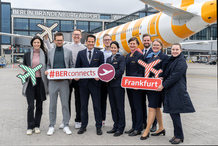Everyone should be able to travel and go on holidays. This should include taking the plane to attractive and popular vacation destinations, from Majorca to the Maldives. However, a wide range of offers and fair prices for travelers can only be achieved with lively competition in the aviation industry.
In recent years, however, competition has come increasingly under pressure. In Europe, six large airline groups dominate the market. Following the demise of Air Berlin, Condor is the only remaining independent airline in Germany that is able to hold its own against the dominance of the big players at national, European and international level.
For fair competition in aviation
Condor advocates for strong competition in aviation. However, big players are increasingly using their market power to disadvantage smaller providers in the market, preventing them from growing and thus fundamentally weakening competition. This has considerable disadvantages for prices and consumers: if routes are only served by one airline, this airline can raise prices at will without any alternative for passengers.
Condor is fighting against the increasing monopolization of the national and European aviation industry – for more connections, for better service and for fair prices. Condor is fighting alongside consumers to ensure that air travel remains affordable in the future.
Four facts about competition in the European and German domestic aviation markets:
The six largest airlines now control 72 percent of the seat capacity offered by all European airlines.
The European aviation industry has been characterized by increasing concentration for decades. Following numerous mergers and acquisitions, AirFrance-KLM, IAG (British Airways, Iberia), Lufthansa, Ryanair, easyJet and Wizz Air share almost three-quarters of the market. And these players are aiming to gain further market share, as demonstrated for example by their interest in TAP Portugal, AirEuropa and other airlines.
Since the demise of Air Berlin, domestic air travel in Germany has been largely monopolized and competition has been virtually eliminated.
Numerous providers of domestic and long-haul flights from Germany have left the market over the past twenty years, including Deutsche BA (2006), LTU (2007), Air Berlin (2017) and Germania (2019). European competitors such as Ryanair, easyJet, and Wizz Air have significantly reduced their activities in Germany and discontinued domestic flights entirely.
Weak competition is one of the reasons why air traffic in Germany is recovering much more slowly than in most other European countries.
According to figures from the German Aerospace Center, the traffic volume in 2024 was around 20 percent below the pre-covid level. High location costs and weak economic growth are cited as reasons. At the same time, the DLR (German Aerospace Center) also points to a lower supply due to the high concentration, particularly in German domestic traffic.
A dominant market position in domestic air traffic in Germany must not lead to a weakening of competition on long-haul routes.
People who fly long distances often need a feeder flight from a smaller airport. In Frankfurt, for example, travelers are mostly dependent on Lufthansa, which has a dominant market position in feeder flights to the Frankfurt hub due to its very limited take-off and landing rights ("slots"). To ensure fair competition on long-haul routes, smaller competitors must also be given appropriate access to these feeder flights.


Twitter